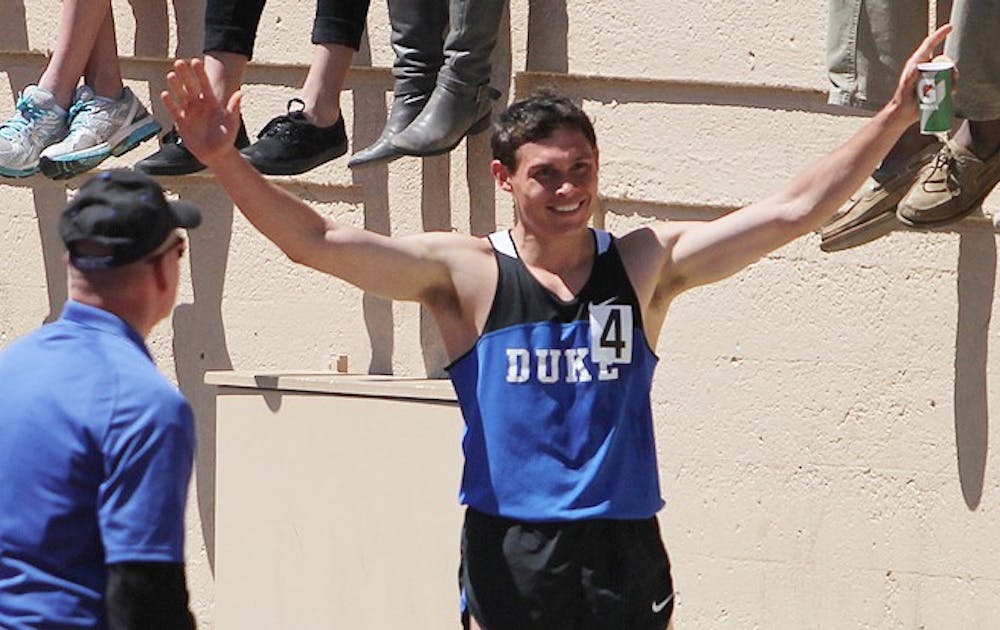American decathlete Ashton Eaton earned the gold medal for the United States at this year’s 2012 Olympic Games in London, but his best performance had come more than a month earlier. It had been at the Olympic Trials in Eugene, Ore. that he broke an 11-year-old world record in the event. And Blue Devil senior Curtis Beach was there to lend Eaton a helping hand en route to his landmark performance.
When Beach and coach Shaun Wilbourn arrived in Eugene, they were focused not on Eaton but on Beach’s own quest to join the U.S. Olympic roster. But as the defending NCAA decathlon champion stepped onto the historic University of Oregon track, Beach knew that anything short of his best showing would not be enough to earn him a place in London. To earn one of the three available spots on the national team, Beach needed to finish in the top three and earn an 8,200-point total that would meet the Olympic “A” standard that guarantees a place on the team. With competitors like five-time NCAA champion Eaton, two-time World Outdoor champion Trey Hardee, and 2008 Olympic gold medalist Bryan Clay, there could be no mishaps for Beach.
He got off to a strong start, holding fifth place after the first two events, but his 11.83-meter shotput throw was the worst in the field and a disappointing high jump dropped him well off the pace he would need.
Then, in the second-to-last event, the javelin throw, an elbow injury caused him to foul and earn zero points, ensuring that the most he would do was finish the competition.
While Beach struggled, however, Eaton was piling up record performances as he moved through the events. The existing record had been set in 2001, when Czech decathlete Roman Sebrle—who would go on to be the gold medalist at the 2004 Athens Olympics—became the first to exceed 9,000 points in the event.
Eaton’s coach Harry Mara watched as Eaton crept up on Sebrle’s world record, but Eaton and his coach avoided discussing the record pace during the competition. It was only before the final event of the competition, the 1500m, that the topic came up at all.
“I knew I was having a great meet overall despite some ups and downs with performances and weather,” Eaton said in an email to The Chronicle.
As the final event approached, Eaton asked Mara what time would be necessary to break Dan O’Brien’s 20-year-old American decathlon record.
“He paused, looked me dead in the eye and said, ‘No Ashton, world record,’” Eaton said. “That’s when I knew I was going to break the world record. That gave me all the confidence in the world.”
Although Eaton had not been focused on his record-breaking opportunity, his pace had not escaped the notice of his competitors. When Beach found out that Eaton’s potential world record depended on his ability to run a personal best time by about two seconds in the 1500m, Beach—the favorite to win the event—approached Eaton and offered to pace him to the finish.
“Curtis came up to me and basically said, ‘Hey man, I can set that pace for you and get you around in that time,’” Eaton said. “I was encouraged by his support and greatly appreciated the gesture, but I didn’t want Curtis to take anything away from his own performance. In years to come, he will be a great decathlete in his own right and I didn’t want…to keep him from running his own race that day.”
When Eaton and Beach stepped up to the line for the final event, their mindsets could hardly have been more different. Eaton was gearing up to “cross the finish line as world record holder no matter what effort it took to do it. ” Beach, on the other hand, knew that regardless of how fast he ran, his 2012 Olympic journey would come to an end at the conclusion of the race.
As the runners took off, all eyes were on Eaton. Despite his best efforts though, he entered the last 600 meters two seconds off the necessary pace. The time gap was announced to the stadium, which responded with even louder cheers.
Joe Detmer, running just ahead of Eaton, began pacing him, slowly pulling away and challenging Eaton to follow then pass him. Beach, who had been running a strong race well ahead of the rest of the competitors, began to slow down and look over his shoulder. As Eaton closed the gap, Beach slowed to a jog and moved well out of the way, waving Eaton on and cheering.
When Eaton made it across the line in 4:14.48 to break the world record by 13 points, Beach threw his hands and the air and finished in third place with a grin on his face.
“At that moment...it was all about Ashton,” Beach said. “We knew who was going to the Olympics and who wasn’t, and the only question was whether or not he was going to get the world record.... To be right there with him when he broke the world record is something that I’ll remember for the rest of my life.”
And Beach’s actions did not go unnoticed by the new world-record holder, who later went on to take gold in London.
“What Curtis did was special for the sport and it was special for the integrity of true sportsmanship,” Eaton said. “The Olympic Trials and the world record set that day are bigger than us as individual athletes. Everyone who competed out there in that decathlon shared that moment together. I know that everyone would have been just as excited and supportive had it been any other person, and that’s what the decathlon is really about at the end of the day.”
Get The Chronicle straight to your inbox
Signup for our weekly newsletter. Cancel at any time.

